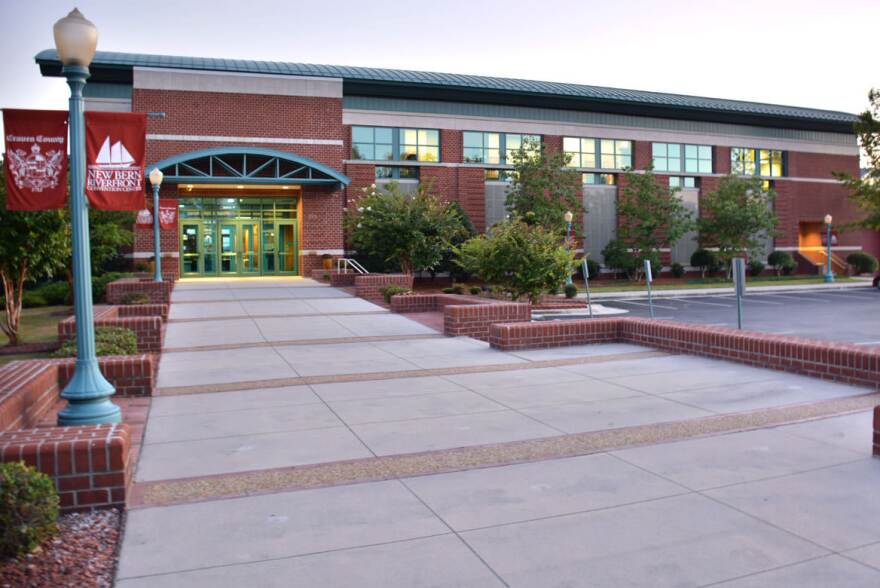The cold weather may have the honey-bees hibernating, but bee-keepers are on the move. The annual North Carolina bee-keepers conference is set for the last weekend in February in eastern North Carolina. Sarah Finch has more on the popularity of this buzzing hobby.

The North Carolina State Beekeepers Association is expecting a pretty sweet turnout for their annual Spring Conference. It’s held at a different location each year, this time it’s in New Bern. The Craven-Pamlico Bee-keepers are hosting the event, titled “Bees on the Bern!” with programs and workshop offering a wealth of honey-bee knowledge. Bees and bee-keeping are essential to our state, and the NCSBA’s mission is to provide resources and education on the subject.
North Carolina Coastal Land Trust Deputy Director Janice Allen says honey bees are an integral part of our ecosystem.
“If you eat fruits, nuts or vegetables, you have to thank a honey-bee or another pollinator. More than 80% of our flowering plants and 1/3 of our foods, rely on pollinators.”

Bees were first introduced to America by the Europeans, to help pollinate new crops like blueberries. As pollinators, they play a big role in the food industry, which is important for our agricultural state.
North Carolina State Beekeepers Association President Rick Coor says this trend is reflected in their membership.
“The NCSBA has about 4,100 paid members for 2015. It’s the largest bee-keeping organization in the United States.”

Rick Coor personally keeps about 50 hives, where he raises honey bee queens each year. He has noticed that bee-keeping appeals to people from all walks of life. And according to him, it has grown tremendously over the past few years.
“Beekeeping is not losing its popularity. Our bee schools are full. The bee schools are led by the local chapters. We have over 70 chapters. And overall they’re well done and they’re well attended. People enjoy them very much.”
These start-up hobbyists only require basic beekeeping equipment, including the wooden hive, a full length bee suit, a smoker, hive tool and of course the bees.
North Carolina Department of Agriculture and Consumer Services Eastern Region Apiary Inspector Adolphus Leonard says it’s a rewarding pastime that can be relatively inexpensive.
“It all depends on what equipment you already have, but a few hundred dollars will get you started. And recently there’s been a new interest with honey bees, because of the nationwide attention that honey-bees got in the pollinator decline problem. So many people have taken an interest in bee-keeping, and that’s a good thing.”

Adolphus Leonard has been an apiary inspector in North Carolina for over 20 years. He will be participating at the Spring Conference with a workshop on disease management in bee colonies.
A hobby bee-keeper himself, Leonard says it’s a great way to connect with friends, local clubs and Association Chapters, while learning how to be a part of the bigger picture.
“Well if you love honey bees it’s quite relaxing. It’s a good diversion, it helps you get back to nature. It’s a great hobby for getting your mind off of work, and there’s always something new to learn.”
With constant changes in the apiary world, it’s important to stay on top of bee-keeping concepts. There are four levels to which aspiring bee-keepers can reach. Certifications start after the first year and continue until the Master Craftsman title is achieved, a position which has to be renewed every five years.
Founding member of the Crystal Coast Bee-keepers Association and Down East Public Library Manager Tia Douglass explains how it starts.

“You take the bee-keeping course and that involves taking a written test and a practical test. The practical test is actually going into the hive, and the teacher will ask you, well what are you looking at, and are you dressed properly, all those kind of questions. And if you pass you get a certification, you’re an NCSBA certified Bee-Keeper.”
Whether you’re an expert or interested in learning about bee-keeping, this Spring Conference offers something for everyone, including vendor booths, committee meetings, Master Beekeeping Testing, a children’s program, and speaker forums. The weekend schedule includes 29 workshops, with topics ranging from ‘How to Design a Honey House’ to ‘Honey Bee Pheromones’.
Tia Douglass says it’s a wonderful opportunity to catch up with good friends and learn more about honeybees.
“There’s all kinds of good things going on. They meet in the auditorium and there’s a lot of talks and then in the afternoon there’s actually classes that you go to. All the bee-keeping vendors are out there and you can buy all kinds of things. They have a wonderful silent auction where people donate things to raise money for honey-bee research.”

The NCSBA has two statewide conferences each year, a spring meeting and a summer meeting. The 2016 Spring Conference is hosted by the Craven-Pamlico Beekeepers at the New Bern Riverfront Convention Center on February 25th through 27th.
To learn more about this event, visit: www.ncbeekeepers.org



